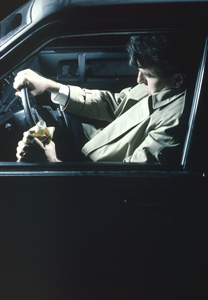Refusals
REFUSALS (REFUSING A DUI CHEMICAL TEST)
Refusing a chemical test for the detection of alcohol and/or drugs has serious consequences for a person’s privilege to drive and personal liberties.
But first, when is it unlawful for a person to refuse? What constitutes a “refusal?”
What drivers cannot refuse?
 Several categories of drivers must submit to chemical tests.
Several categories of drivers must submit to chemical tests.
- Any driver under 21 years of age suspected of any alcohol use must submit to a preliminary alcohol screening device test (“PAS”) and then, upon arrest, a breath or blood test.
- Any person on probation whose terms and conditions require submission to a chemical test do not have the right to refuse any chemical test when requested by any peace officer. In 2008, the law will criminalize any refusal by a person on probation of any chemical test for the detection of alcohol and/or drug use while driving. This new crime would be in addition to any violation of the driver’s current probation.
- Any adult drivers (21 years or older) upon arrest for suspected use of alcohol and/or drugs while driving must submit to a breath or blood test (urine or blood test if drugs are suspected).Please note: adult drivers, 21 years or older, not on probation, can lawfully refuse a preliminary alcohol screening device test (“PAS”).
What constitutes a refusal?
The facts of each case must be carefully reviewed. “Refusals,” like people, are all different. For example, a “refusal” based on a driver’s confusion concerning being Mirandized (“read your rights” pursuant to the famous Miranda case) is certainly different from the classic, fighting, belligerent person who, from the onset, is combative and resistive with police. In analyzing refusals, attorneys must try to determine if the refusal was caused by police conduct or an equipment failure rather than by the driver’s level of intoxication. Merely being too intoxicated to perform a test is not a defense to a refusal. Moreover, failure to complete a test does not excuse the driver; the driver must submit to an alternative test.
Police must properly warn the driver of the consequences of the refusal before a court can state that the driver actually “refused.” In addition, police must make certain that the driver understood the consequences of the warning. For example, police cannot claim a person was warned about the consequences of a refusal if the person had a physical or mental impairment that prevented him or her from hearing or understanding the admonition.
Police can forcibly extract blood upon a refusal
Police have the legal authority to obtain a blood sample without the driver’s consent. The law allows this “involuntary” extraction of blood with the justification that evidence of alcohol use will disappear (via the natural process of elimination by the liver) if not quickly “seized” as evidence by authorities.
What are the penalties for a refusal?
A refusal, on the DMV side, means for first time DUI offenders, the suspension period is one year with NO possibility for any restricted license. For multiple offenders, the DMV adds on additional year to the suspension period mandated by law. For example, for a second time DUI offense (two DUI convictions and/or suspensions within ten years), the suspension normally is one year. A refusal increases the time from one year to two years.
In court, a refusal may be punished more severely that a typical DUI case. In addition to the penalty that the DUI itself carries, persons who refuse a chemical test after arrest face additional potential penalties that can add to a DUI sentence. Upon the conviction of a first offense DUI with a refusal alleged, the driver may face an additional 48 hours of jail. A second offense DUI with refusal may be punished by an additional 96 hours of jail. A third offense DUI with refusal may result in an additional 10 days in jail to the penalty associated with the third offense DUI.
DISCLAIMER: The results of any person’s DUI case described on this web site and/or in the Bay Area DUI Law newsletter depend on factual and legal circumstances that are unique to a specific person. Information provided by this web site and/or the Bay Area DUI Law newsletter does NOT constitute a guarantee, warranty or prediction regarding the outcome of your legal matter. Any reference to laws, procedures, punishment or license consequences at court or the DMV in this web site and/or Bay Area DUI Law newsletter is NOT intended to be complete description of what can and will happen in any or every DUI case but instead is a simplified summary to facilitate the reader’s understanding of general issues involving DUI law. The law is in constant change; penalties and consequences change; as such, the reader should not and cannot rely upon anything mentioned in this web site and/or Bay Area DUI Law newsletter. The reader is strongly advised to seek competent legal counsel to ascertain the law, penalties and consequences that apply to his/her unique circumstances.

